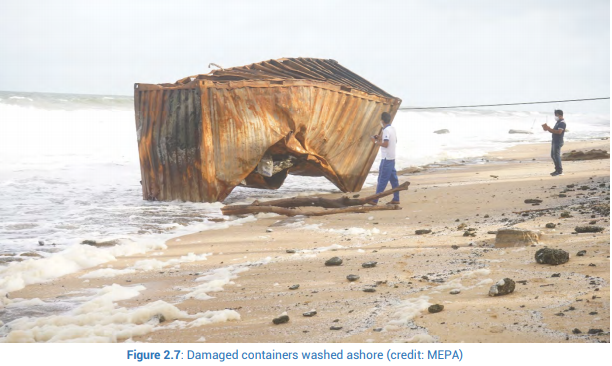The X-Press Pearl incident is the worst maritime disaster to have struck Sri Lanka. It has had a significant impact on Sri Lanka’s sensitive coastal environment, local communities and the economy. Moreover, the event continues to unfold, and its active pollution generation phase will only come to closure with the elimination of the risks from the wreck and containers lost at sea.
Along with uncertainties of cascading environmental damage, the incident’s complexity stems from the range of pollutants involved – oil, hazardous chemicals and plastics – and the lack of clarity regarding the nature and status of a substantial part of the vessel’s cargo. Moreover, the growing geographic extent of the plastic spill – the largest on record – is expected to have transboundary impacts further compounding the problem.
There are two immediate risks from the incident that need to be eliminated as soon as possible:
- a sudden major spill of the fuel oil aboard the ship; and
- pollution and navigational hazards from the wreck and lost containers.
Proactive and vigilant surveillance are required to mitigate these risks. With the development of offshore and shoreline clean-up plans, as well as the deployment of response equipment, key actors are now relatively well pre-positioned to deal with a possible oil spill. Action to contain and recover the limited but continuous release of oil from the wreck should be taken as soon as conditions allow.
Similarly, planning needs to be initiated to remove the wreck, lost containers and debris as a matter of priority. A detailed roadmap for this major decommissioning project needs to be developed immediately in a consultative and transparent manner, and independently from current concerns over monsoon related weather challenges. Government sanctioned oversight is imperative to ensure accountability for the satisfactory conduct of the work and instilling public confidence in the wreck and debris recovery process.
Despite the operational constraints of COVID-19 lockdown restrictions, Sri Lanka’s authorities are implementing a commendable and efficient clean-up campaign of the plastic spill. Nevertheless, several key actions need to be carried out to enhance its effectiveness including:
i) contamination analysis of the plastic waste to determine if it is hazardous or not;
ii) refining and scaling-up clean-up techniques that minimize sand abstraction and recover small burnt particles; and
iii) establish technical specifications for completion of microplastic clean-up operations while minimizing inadvertent environmental damage.
Environmental assessment of the incident needs to focus on pollution ‘hot spots’; namely the area of the wreck and impacted shoreline sites. The investigation strategy should be directed at resolving several key questions with significant socio-economic implications and to allay public concerns, notably:
- is the fish inside/outside the designated ‘no fishing area’ safe to eat?
- when should the moratorium on fishing be lifted?
- is the reported spike in turtle and marine mammal deaths linked to the incident?
A biomonitoring programme is recommended as a relatively simple and cost-effective option to monitor the situation around the wreck, including the status of sensitive marine ecosystems (i.e. coral reefs) in the wider incident area.
While extensive sampling has been conducted, it is now important to focus the analysis on key parameters and expedite laboratory testing to generate scientific results for decision making and assess the actual damage from the incident. The results should also help inform the design of a longer-term monitoring programme of the marine environment. This is vital not only to track this disaster’s ecological impacts, but also to obtain insight on baseline conditions which are essential for conducting scientific assessment and remediation of future maritime incidents. A sound knowledge base is also a central requirement for litigation and damage and loss assessments.
Beyond short-term remedial counter measures, ultimately real progress is for Sri Lanka to emerge from this traumatic experience with a more resilient system for preventing and responding to future maritime disasters. This would require a multi-year initiative that would include:
- development of a maritime disaster plan (building on the existing NOSCP);
- strengthening the institutional basis for its implementation; and
- a capacity building and training programme.
An initiative of this scale hinges on forging a solidarity coalition between the Government of Sri Lanka and its international friends and partners. Success will ultimately depend on coordinated action between diverse actors and hence the importance of a designated mechanism to organize international support. Thereby reinforcing Sri Lanka’s efforts to consolidate its position as a global maritime and logistical hub, while assuring greater protection of ocean health, fishery resources and world trade.
Read the full report:X-Press_Sri Lanka_UNEP_27.07.2021_s (1)
